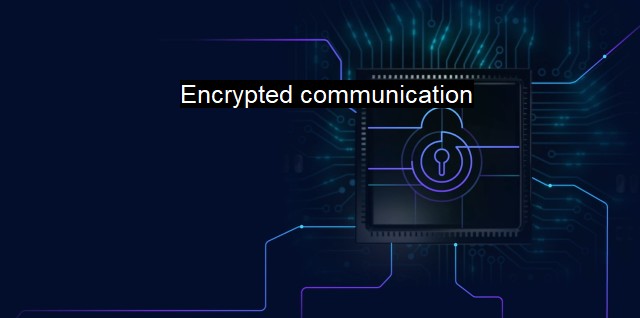What is Encrypted communication?
How Encryption is Revolutionizing Cybersecurity: Unleashing the Power of the Encryption Process to Protect Sensitive Information from Digital Threats
Encrypted communication is a method of transferring information in a way that only the sender and receiver can access. This process is mainly established through complex mathematical algorithms that convert plain text data into a jumbled, uninterpretable code, also known as ciphertext. The technology used for this conversion is popularly known as encryption.Encryption plays an integral role in ensuring the security of sensitive data. encrypted communication is key in making sure that no unauthorized entity can access and understands the transmitted data. This is particularly handy in scenarios such as online shopping, banking, and exchanging private emails where personal information needs to be kept confidential for the safety of the users.
A typical process of encrypted communication begins with the creation of encryption keys by the sender’s device. These keys are applied to the original data, resulting in an encoded message that cannot be read by anyone. The encrypted message is sent out over the internet, increasing its vulnerability to interception. due to its unreadable nature, it provides no useful information to uninvited readers.
To unlock the secret message, the receiver must apply a decryption key, essentially the “inverse formula” that reverses the encryption process, hence revealing the original data. This decryption key is securely shared between sender and receiver. Two main forms of this key exchange are symmetric-key encryption, where both sender and receiver use the same key, and asymmetric-key encryption, that utilizes a pair of complementary private-public keys – one for encrypting and the other for decrypting.
Antivirus software is designed to detect and thwart threats to the security of computer systems. In parallel to encryption efforts, they provide an essential layer of prevention against unauthorized retrievals. Modern antivirus also incorporate capabilities that lookout for encryption-based malware tactics. These could be Trojans posing as legitimate encryption tools or ransomware attacks where the attacker encrypts a victim's personal data and demands a ransom for the decryption key.
Ironically, cyber criminals also find value in encryption techniques, fostering the development of darker encryption tactics. Dark encryption involves cyber-attackers implementing cryptography for their illegal activities. They use encryption to communicate without being detected and to protect their malware from being analyzed.
Encrypted communication technologies remain a key arsenal in protecting the privacy and integrity of information, and its importance will undoubtedly grow in line with the digital age. Advanced encryption techniques are continuously being researched and developed globally to combat evolving threats from cyber-attackers.
Encryption and decryption is a double-edged sword, as it can be a reliable shield for abiding users, and simultaneously, a concealed weapon in the hands of hackers. Tech companies, cybersecurity firms, and antivirus developers need to always stay a step ahead of these hackers. They should continuously invest in encryption technology enhancement, threat recognition systems, and public education for the safe use of the internet.
The ultimate goal of encrypted communication is the dependable implementation of flexible and robust encryption measures, keeping data secure but accessible to those rightfully entitled to it. By practicing secure communication and utilizing reputable antivirus software, a safety net against most cyber threats can be created —an important step in maintaining privacy, data integrity, and the overall security in an increasingly digital age.

Encrypted communication FAQs
What is encrypted communication?
Encrypted communication is the process of sending and receiving data that has been scrambled into an unreadable format to prevent unauthorized access.Why is encrypted communication important in cybersecurity?
Encrypted communication is crucial in cybersecurity because it ensures that sensitive information, such as passwords or credit card numbers, cannot be intercepted and read by hackers.How does antivirus software relate to encrypted communication?
Antivirus software can help detect and prevent attempts to intercept encrypted communication by identifying malware or other threats that may be attempting to gain unauthorized access to sensitive data.What are some examples of encrypted communication technologies?
Secure Sockets Layer (SSL), Transport Layer Security (TLS), and Virtual Private Networks (VPNs) are all examples of encrypted communication technologies that are commonly used to enhance cybersecurity.| | A | | | B | | | C | | | D | | | E | | | F | | | G | | | H | | | I | | | J | | | K | | | L | | | M | |
| | N | | | O | | | P | | | Q | | | R | | | S | | | T | | | U | | | V | | | W | | | X | | | Y | | | Z | |
| | 1 | | | 2 | | | 3 | | | 4 | | | 7 | | | 8 | | |||||||